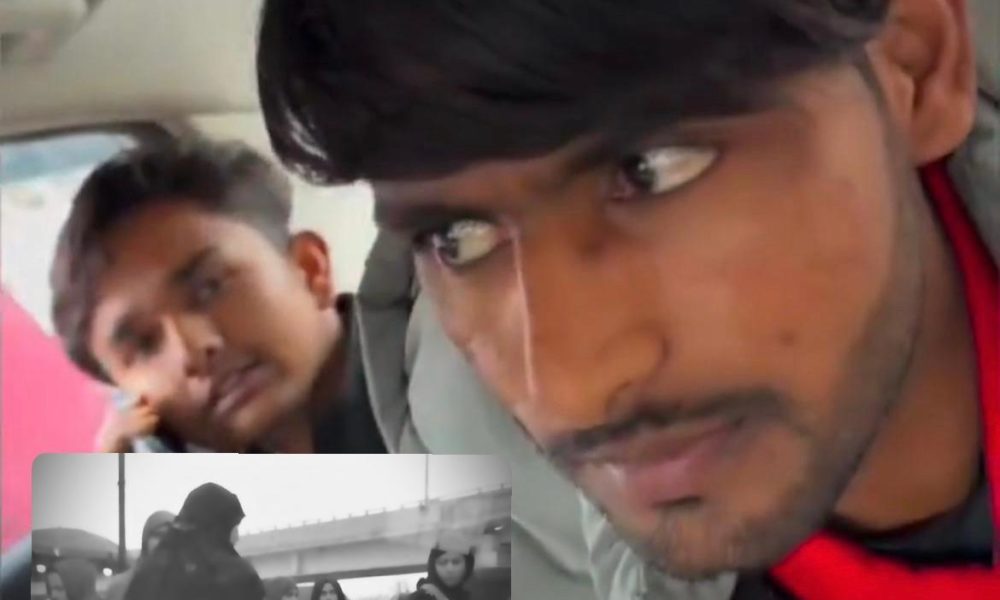From Social Media Fury to Legal Action: How Kashmir’s Fight for Dignity Exposes Tourism Ethics & Digital Harassment Crisis
By: Javid Amin
A Digital Age Scandal Rocks Kashmir : In February 2025, Srinagar became the epicenter of a firestorm when a viral video exposed non-local men brazenly filming Kashmiri women from a moving car, stripping them of their privacy and dignity. The footage, shared widely across platforms like X (formerly Twitter), Instagram, and TikTok, ignited fury not just in the Valley but globally, reigniting debates about consent, cultural exploitation, and the safety of women in public spaces. This incident isn’t isolated—it’s a symptom of deeper systemic issues plaguing regions grappling with tourism, patriarchy, and digital voyeurism.
The Incident: Anatomy of a Viral Outrage
The 47-second video, shot covertly from a car window in Srinagar’s bustling Lal Chowk area, captures unsuspecting women going about their daily lives—shopping, chatting, or simply walking—while the perpetrators laugh and zoom in on their faces and attire. The clip’s metadata revealed it was filmed days before going viral, suggesting intentional sharing to provoke reactions. Key details:
- Location: Lal Chowk, Srinagar’s commercial hub.
- Victims: At least 12 women identified, aged 17–45.
- Platforms: Shared via Telegram groups first, then X and Instagram.
- Public Reaction: Over 500,000 posts with #RespectKashmiriWomen within 48 hours.
Cultural Context: Kashmir’s Struggle with Exploitative Tourism
Kashmir, often romanticized as “Paradise on Earth,” has long battled commodification. Post-2019 tourism surges brought economic hope but also ethical dilemmas:
- Safari Mentality: Tourists treating locals as “exotic exhibits” (per activist Aisha Mir).
- Gender Dynamics: Conservative norms clash with outsiders’ intrusive behavior.
- Historical Parallels: Similar incidents in 2018 (European backpackers photographing mourning processions) and 2021 (influencers staging insensitive reels at Dal Lake).
Public Outcry: From Hashtags to Streets
Social media erupted with demands for accountability:
- Celebrity Backlash: Bollywood actor Swara Bhaskar tweeted, “Kashmiris aren’t zoo animals. Stop the colonial gaze!”
- Local Protests: Women’s collectives staged sit-ins at Press Enclave, holding placards reading “My Body, Not Your Content.”
- Global Solidarity: The UN Women’s India chapter condemned the act, urging stricter cyber laws.
Viral Tweets:
- “Kashmir is a HOMELAND, not your Instagram backdrop. Arrest these predators NOW!” – @InsaafKashmir (12K retweets).
- “Why must we beg for basic respect? Enough #DigitalColonialism!” – @FatimaWani (8.4K likes).
Authorities Under Fire: Delayed Action & Broken Promises
While Srinagar Police registered an FIR under Sections 354C (voyeurism) and 509 (insulting modesty) of the IPC, critics highlight systemic apathy:
- Past Failures: 2023 case where influencers faced mere fines for filming shrine visitors.
- Political Angle: Jammu & Kashmir National Conference leader Omar Abdullah tweeted, “When will tourism policies prioritize dignity over revenue?”
- Police Response: SSP Rahul Malik stated, “We’re using facial recognition tech to identify suspects. Justice will be swift.”
Legal Landscape: Weak Laws & Loopholes
India’s IT Act 2000 and IPC lack teeth against cyber harassment:
- Section 66E: Penalizes filming without consent but rarely enforced.
- Data Deficits: Only 12% of digital harassment cases in Kashmir led to convictions in 2024 (NCRB data).
- Global Lessons: EU’s GDPR mandates strict consent laws; activists demand similar frameworks.
Expert Quote:
“Laws must evolve with technology. A woman’s right to say ‘no’ should extend to cameras.” – Adv. Priya Sharma, Cyber Law Specialist.
Do’s & Don’ts: Navigating Privacy in the Digital Wild West
Do’s:
- Consent is King: Always ask before filming; respect a “no.”
- Educate Travelers: Tour operators must brief visitors on cultural norms.
- Use Tech Wisely: Blur faces in public content (see EU’s Right to Be Forgotten).
- Support Victims: Share helpline numbers (e.g., J&K Women’s Commission: 0194-2456789).
Don’ts:
- Don’t Share, Even Casually: Forwarding invasive content makes you complicit.
- Avoid Victim-Blaming: “She should’ve covered up” perpetuates rape culture.
- Don’t Trust Algorithms: Report posts; platforms won’t act unless pressured.
Parents & Guardians: Protecting Daughters in a Predatory Digital World
The incident underscores the need for vigilance:
1. Open Dialogue Over Surveillance
- Talk Early, Talk Often: Normalize discussions about consent (“If someone films you, it’s NOT your fault”).
- Spot Red Flags: Sudden secrecy, withdrawal, or anxiety around phones.
2. Tech Tactics
- Tracking Apps: Use Google Family Link or Life360 for location checks (but respect privacy).
- Privacy Settings: Ensure social media accounts are private; disable geotags.
3. Community Defense
- School Workshops: Partner with NGOs like CyberPeace Foundation for digital literacy camps.
- Neighborhood Watch: Share info about suspicious activities via WhatsApp groups.
Parent Testimonial:
“After the video, I taught my daughter to scream ‘Don’t film me!’ It’s heartbreaking, but necessary.” – Rafiya Bano, Srinagar mother.
Bottom-Line: From Outrage to Action
This scandal is a wake-up call. Kashmir’s women deserve more than hashtags—they need systemic change:
- Policy Reform: Stricter laws with harsher penalties for digital harassment.
- Ethical Tourism: Licenses revoked for operators enabling exploitative behavior.
- Grassroots Movements: Amplify groups like the Kashmir Women’s Collective.
As netizen @TrueKashmirVoice declared, “Respect isn’t negotiable. We’re watching.”



